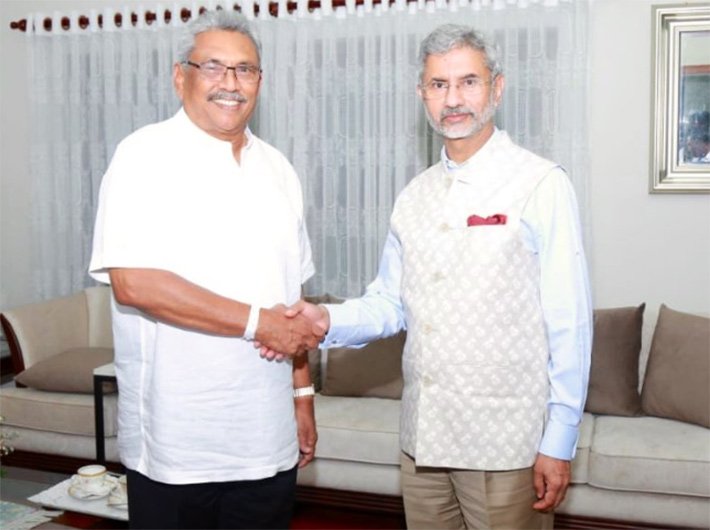In a rare development in Sri Lanka’s history, two siblings are now at the helm of the island nation’s affairs. While the younger brother, Gotabaya Rajapaksa, is the new president, elder brother Mahinda Rajapaksa has become prime minister, indicating clearly that over the next five years Sri Lanka will be led by a family which played a role in ending the three-decade long civil strife in the country.
India, a neighbour, doesn’t want to miss the bus in its efforts to cement ties with the island nation’s new leadership that has vowed to remain “neutral” in the country’s relationship with global powers.
In fact, in pursuance of New Delhi’s neighbourhood strategy, prime minister Narendra Modi congratulated the newly elected Sri Lankan president, and external affairs minister S Jaishankar on November 19 took the first flight to Colombo to meet him and hand over an invitation to visit India.
The Sri Lankan president, knowing his country’s centuries-old ethnic, cultural and religious relations with India which is also significantly contributing to the island country’s economic development, promptly accepted the invitation to visit New Delhi on November 29-30.
Diplomatic sources say New Delhi will throw a red-carpet welcome to Gotabaya Rajapaksa during his visit. Also, the two countries will sign a few MoUs during the presidential visit. New Delhi sees the visit as an opportunity to mend fences with the Rajapaksa family whose perceived pro-China leaning is a cause of worries for strategic thinkers in India.
Gotabaya Rajapaksa, however, is reported to have stated that he will remain neutral in his country’s relations with global powers. “We don’t want to get in between the power struggles of superpowers and world powers; so, basically, we want to work with all the countries and we don’t want to do anything which will harm any other country. We understand the importance of the Indian concern; we can’t especially act or engage in any activity which will threaten the security of India,” he said this month in an interview with sniwire.com, a Delhi-based news portal.
India has already maintained that its relationship with Sri Lanka is not dependent on a third country. “Our relationship with Sri Lanka or for that matter with any country is not dependent on a third country, it stands independently. We enjoy historical and very close relationship with Sri Lanka and we are looking forward [to] and we will work very closely with the new Sri Lankan government,” external affairs ministry spokesperson Raveesh Kumar said.
But that doesn’t mean India will lower its guard on issues that impact its national interest. In his first meeting with Gotabaya Rajapaksa, Jaishankar is said to have conveyed India’s expectation from the new Sri Lankan government for action on the National Reconciliation Process so as to meet the Sri Lankan Tamil community’s aspiration for equality, peace, justice and dignity. The reconciliation process envisages investigation into the alleged abuse of human rights of minority Tamils by Sri Lankan forces during the last phase of the war against LTTE in 2009.
In the run-up to the presidential election in the island nation, Gotabaya Rajapaksa had said on October 15 that if he won, he wouldn’t recognize the agreement the outgoing government had made with the UNHRC to investigate alleged war crimes during the country’s civil war. But India under the Modi government wants the Sri Lankan government to start the National Reconciliation Process immediately. This can impact the assembly elections in India’s southern state of Tamil Nadu in 2021. Sri Lanka’s previous government under president Maithripala Sirisena too avoided undertaking the reconciliation process on account of pressure from the majority Sinhalese community.
After initial friendliness towards India, Sirisena had turned indifferent towards New Delhi in the last phase of his five-year term. In October 2018, media highlighted his reported allegation against the RAW stating that the Indian intelligence agency was plotting his assassination. Sirisena later clarified, terming media reports as mischievous, baseless and false.
Despite several meetings between Indian and Sri Lankan officials, the previous government in the island nation implemented only in parts the 13th Amendment to the Constitution, envisaging devolution of powers to the provinces and enabling Sinhalese and Tamil to develop as national languages while preserving English as the link language. During his meeting with president Gotabaya Rajapaksa, Jaishankar is said to have raised this issue too.
Besides, India wants Sri Lanka to implement projects of high public importance without much delay. India has agreed to provide help to Sri Lanka in over 70 projects in various fields under its South-South cooperation programme. Only around 20 projects, including construction of toilets, schools and dispensaries are in progress. However, all this excludes India’s commitment to build 60,000 houses in Sri Lanka. So far 46,000 houses in the Northern and Eastern Provinces have been completed.
The overall development portfolio of India in Sri Lanka currently stands at $3 billion, of which $560 million are in grants. India is also a key investor in Sri Lanka with total investments in sectors like IT, real estate, financial services, telecommunication, hospitality and tourism, banking, food processing, copper and other metal industries, tires, cement and others standing at $1.239 billion. Yet India’s investment in Sri Lanka pales in comparison to China which has invested an estimated $11 billion, of which about $8 billion is in the form of loans granted under the Belt and Road Initiative.
With the Rajapaksas at the top of Sri Lanka’s administrative pyramid, there is a fear in India that China will find it easy to increase its influence in political, diplomatic and strategic affairs of the island nation. This fear has been scotched by the new Sri Lankan president as he stated that his country’s engagement with China is purely “commercial”. “I invite India, Singapore, Japan and Australia to come and invest here. Don’t allow only China to invest (here).”

